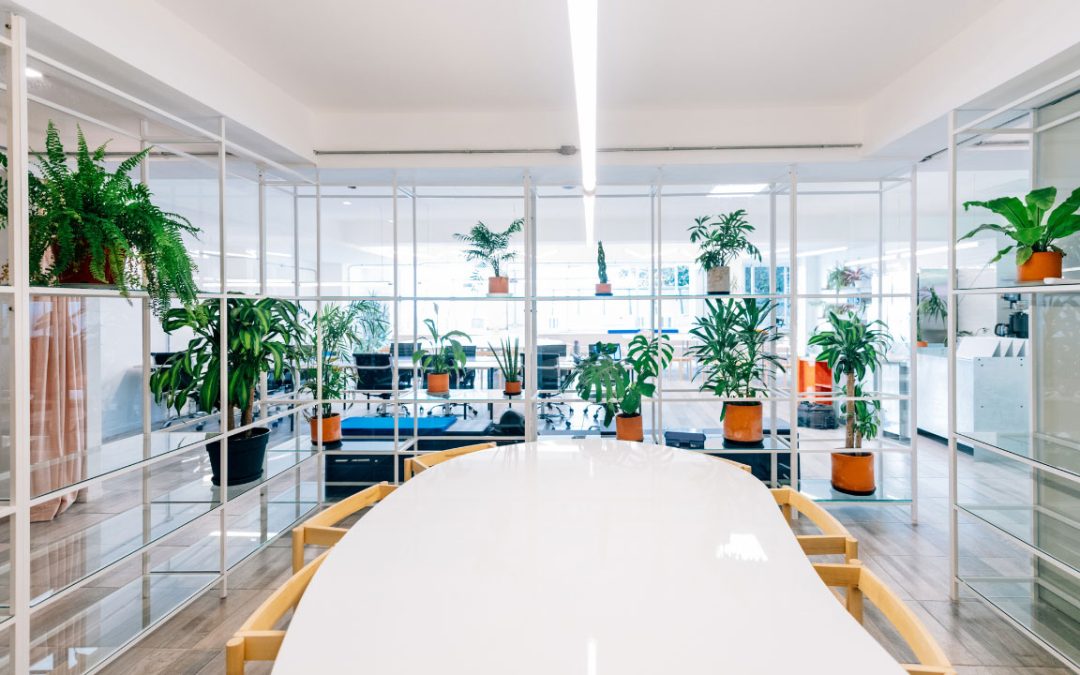Key Takeaways
- Plants like English ivy, spider plant, and peace lily can significantly enhance indoor air quality by removing toxins, which can lead to improved health and productivity.
- The presence of plants in the office has been proven to lower stress levels among employees, fostering a more relaxed and productive work environment.
- Choosing plants like pothos, snake plant, and ZZ plant, which require minimal care, ensures they thrive in busy office settings without adding to workloads.
- Office plants can boost cognitive function and inspire creativity, which are crucial for enhancing productivity in the workplace.
- When selecting plants, consider factors such as light availability, humidity, and space, to ensure that the plants not only survive but also contribute positively to the office environment.
Adding greenery to your office with interior planting design isn’t just about looks. It’s about boosting productivity too. Many studies have found that office plants improve mood. They also reduce stress and enhance the work environment. In modern workplaces, productivity and well-being are key. Surprisingly, one of the simplest ways to boost both might be placing office plants well.
The best office plants increase work productivity. They include the snake plant, peace lily, and spider plant. These plants are known for being low maintenance and for purifying the air.
This guide discusses the plants for your office plant design to boost productivity and create a healthier workplace. Learn how to choose and care for your office greenery effectively.
How Plants Increase Work Productivity
Plants have a significant and multifaceted impact on workplace productivity. They offer both mental and physical benefits. These benefits help create better and more satisfying work.
Psychological Engagement And Well-being
Research by the University of Exeter found that adding plants to a ‘lean’ office can boost productivity by up to 15%. Plants in the office boost satisfaction, focus, and air quality perceptions. This change improves the look of an office. It also makes a workplace more engaging and emotionally satisfying. This is crucial for productivity and employee well-being.
Creativity And Cognitive Function
Incorporating plants into office spaces can stimulate the senses and inspire creativity. The bright colors and natural elements of plants help wake up the mind. They free it from mental ruts and promote innovative thinking. This effect is partly due to the psychological impact of being surrounded by greenery. Greenery is known to be calming. It reduces stress and enables creative thought.
Air Quality And Health
Plants improve indoor air. They do this by absorbing harmful gases like carbon dioxide, ozone, and formaldehyde. They then release oxygen. This not only makes the air cleaner but also healthier to breathe, which can reduce sickness and absenteeism in the office. Plants reduce ‘sick building syndrome’ symptoms. These include less tension, anxiety, and fatigue.
Noise Reduction And Environmental Comfort
Plants also play a role in reducing noise levels within office spaces, particularly in open-plan layouts. They absorb sounds. This can reduce the distraction of office chatter. It makes it easier for employees to focus on their tasks. Moreover, by increasing humidity, plants can also reduce the need for air conditioning. They can make offices more comfortable, so they are better places to work.
Factors To Consider When Choosing An Office Plant
When selecting plants for an interior planting design, several key factors must be taken into account to ensure the plants not only survive but thrive, thereby enhancing the workspace. Understanding these factors can greatly contribute to the success of integrating greenery into office settings.
- Light Conditions: Different plants have varying light requirements. Some plants, like the ZZ plant or snake plant, thrive in low-light conditions and are ideal for offices without abundant natural light. Conversely, plants like jade plants and peace lilies need bright, indirect sunlight to grow optimally.
- Humidity Levels: Humidity is another crucial factor, as some plants require a more humid environment to flourish. For instance, tropical plants such as the Areca palm thrive in higher humidity levels and can help regulate indoor climates by releasing moisture into the air.
- Air Quality: Plants can significantly improve air quality by filtering harmful toxins and pollutants. Species like English ivy and spider plants are particularly known for their air-purifying properties. Placing these plants in an office can help create a healthier, breathing environment, which is vital for maintaining employee health and productivity.
- Maintenance Requirements: Considering the maintenance needs of office plants is essential. Low-maintenance plants such as pothos or philodendrons are suitable for busy office settings where regular care might not be feasible. These plants require minimal watering and care, making them convenient choices for offices.
Top Plants For Various Office Conditions
Plants That Thrive In Low-Light Conditions:
- Snake Plants: Snake plants are very durable, require minimal light, and are known for improving indoor air quality by removing toxins like benzene and formaldehyde. They also uniquely release oxygen both day and night, making them excellent for office environments.
- Spider Plants: Spider plants are not only easy to care for but also excel in purifying the air from contaminants such as formaldehyde and carbon monoxide. They can grow well even in low-light conditions and are very forgiving for those new to indoor gardening.
- ZZ Plant: This plant is ideal for office spaces with limited light and is very low maintenance. It only needs watering when the soil has dried out and can thrive in areas with minimal natural light.
Plants That Require Indirect Sunlight:
- Jade Plants: Requiring bright, indirect sunlight, jade plants need minimal watering. They are known for their thick, lush leaves and can add a touch of green elegance to any office desk or shelf.
- Peace Lily: Famous for its ability to bloom indoors with its striking white flowers, the peace lily prefers shady areas. It’s also a champion in purifying the air, removing toxins such as benzene, formaldehyde, and trichloroethylene. However, it’s important to note that they require a bit more attention to watering and are not pet-friendly.
Plants That Help Improve Air Quality:
- Aloe Vera: Known for its medicinal properties, aloe vera also improves air quality by removing formaldehyde and benzene. It’s best placed in locations with indirect sunlight and doesn’t require frequent watering.
- English Ivy: This plant is effective in reducing several airborne pollutants, including benzene, formaldehyde, and trichloroethylene. It thrives in cool temperatures and moderate light conditions, making it suitable for office environments where the temperature and light are controlled.
- Areca Palm: Besides being a decorative addition, the Areca palm acts as a natural humidifier and is effective at removing toxins like xylene and toluene from the air. It prefers indirect light and higher humidity levels, which can be beneficial in dry office environments.
Low-Maintenance Plants For Busy Offices
Pothos:
Pothos, also known as Devil’s Ivy, is an exceptionally hardy plant that thrives in a variety of lighting conditions, from low light to bright, indirect light. It’s perfect for offices because it only needs watering once the top inch of soil has dried out. This plant can also be easily propagated through stem cuttings, making it economical to expand greenery in your office without additional cost. It’s important to clean the leaves occasionally to keep them looking fresh and to allow the plant to breathe better.
Rubber Plant:
The Rubber Plant is not only visually striking with its bold foliage but also adaptable to lower light conditions, requiring infrequent watering. This makes it a great addition to office spaces, especially larger ones where it can serve as a floor plant and grow quite substantial. Rubber Plants are effective in purifying the air by removing toxins, enhancing the office environment’s healthiness.
Philodendron:
Philodendrons are valued for their diverse variety and ease of care. These plants prefer indirect bright light but can adapt well to lower light. Watering is typically required when the top 50-75% of the soil feels dry. One of the advantages of philodendrons is their ability to be propagated easily from cuttings, which allows you to multiply your office plants effortlessly. They also contribute to better air quality and can be trained to grow along walls or shelves, adding to their decorative flexibility.
Practical Tips For Maintaining Office Plants
To ensure your office plants remain healthy and vibrant, consider these general care tips:
- Watering: Establish a consistent watering schedule. Most office plants prefer the soil to be somewhat dry between waterings. Always ensure excess water can drain, as stagnant water can lead to root rot.
- Lighting: Position your plants based on their light needs. Plants like Philodendrons and Pothos can tolerate lower light, making them ideal for offices without abundant natural light.
- Humidity and Temperature: Most office plants prefer average room temperature and can thrive in typical office humidity. However, plants like Philodendrons benefit from higher humidity, which can be achieved using a pebble tray or a humidifier.
- Routine Maintenance: Regularly check your plants for signs of distress, such as wilting, yellowing leaves, or stunted growth. Adjust care practices accordingly and engage in routine pruning to keep plants healthy and well-shaped.
Frequently Asked Questions
What are the best plants for improving air quality in an office?
Plants like the spider plant, English ivy, and peace lily are known for their great air-purifying abilities. They remove common toxins and improve air quality.
How often should office plants be watered?
How often you water depends on the plant type and the office environment. But, for most office plants, water when the top inch of soil is dry.
Can office plants help reduce workplace stress?
Yes, studies have shown that plants in the office can reduce stress. They do this by making the environment more calming and pleasant for employees.
What plants are best for low-light office conditions?
Snake plants, ZZ plants, and pothos are great for low-light offices. They thrive in minimal light and need little care.
Are there any plants that should be avoided in offices?
Most plants are good. But, avoid high maintenance ones, like orchids, and allergy triggers, like flowering plants.
How do plants impact employee productivity?
Plants can boost productivity by up to 15%. They do this by improving thinking, cutting fatigue, and raising satisfaction. They also improve air quality.
Incorporate The Best Plants Into Your Office Design With Mr. PlantSoCal
Adopting an office plant design is more than just a decorative measure; it’s a strategic approach to foster a healthier, more engaging, and productive workplace. From air-purifying species to low-maintenance varieties, the right plants can significantly contribute to the physical and psychological well-being of employees. Remember, a small addition of green can lead to big improvements in productivity and office atmosphere.
Transform your workspace with the perfect office plants. Contact us at Mr. PlantSoCal today to explore a wide range of indoor plants that will thrive in your office environment.


